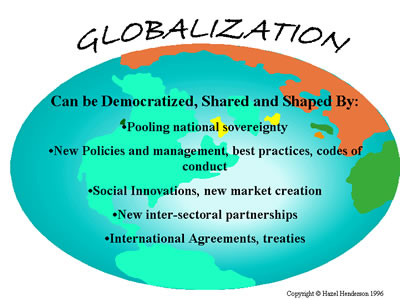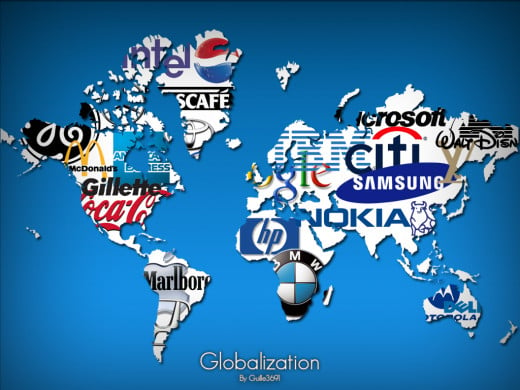What is Globalization?

Introduction
Globalization can be described as the integration of the world whereby peoples around the world grow in interdependence. Globalization is most prevalent along economic and financial lines as observed in the growth in international trade and cross borders commerce since the early 1980s.
International trade can best be described as the exchange of goods and services from one nation to another. International trade continues to grow in prevalence around the world due to what scholars and practitioners have described as "globalization." Globalization has been made possible by continuous advancements in communication and transportation technologies that in effect have brought people of various cultures in closer and increasing contact with each other. This hub will discuss the concept of globalization and its relationship to international trade.
Globalization - The Ingenuity of Human Beings
In the first book of the Hebrew and Christian Scriptures (the book of Genesis), the author tells the story of the Tower of Babel. The context of the story is that God the alleged Creator of all things commanded human beings to be fruitful and multiply and scatter about the earth in order to be caretakers of the earth. However, a strong warrior named Nimrod seemed not to like God's plan to scatter and attempted to organize the people to keep them together (apparently under his rule). In order to carry out his plan Nimrod designed a building project that would give the people a vision to stick together. When God observed this plan and behavior, he commented "If left together as one people, there would be no limit to what human beings could accomplish if they decided to work together."
Today, four to five millenia later we are certainly witnessing the fruition of that statement. Human beings from all over the world whether as a common effort or in competition are accomplishing technological feats that in past centuries were far beyond the imagination of ordinary men and women.
Perhaps chief among the technological advances have been continuing developments in the areas of communication and transportation that have afforded human beings from different cultural backgrounds the opportunity to come together in order to cooperate and collarborate in many areas of life including international trade or cross borders commerce.
These technological advances in communication and transportation have brought about a growing phenomena that experts have chosen to label "globalization."
Our Common Bond

What is Globalization?
Although there is not any one universally accepted definition, Mamman and his colleagues (2013) found the term "globalization" to be defined in the following ways:
"The multiplicity of linkages and interconnections between states and societies which make up the present world system, It describes the process by which events, decisions, and activities in one part of the world come to have significant consequences for individulas and communities in quite distant parts of the world" (McGrew and Lewis, 1992, p. 23).
"The growing interdependencies of countries worldwide through the increasing volume and variety of cross-border transactions in goods and services, and of intentional capital flows and also through rapid and widespread of diffusion of all kinds of technology" (IMF, 1997).
or
"The organization of production and consumption of goods and services at the global level achieved mainly through transnational corporations" (Randall and Theobald, 1998, p. 237).
Put more simply, globalization can be defined as economic, social, political, and/or cultural integration on the worldwide level.
Global Integration

Antecedents of Globalization
Some of the antecedents or causes of globalization include:
- Drive for economic success and even perhaps supremacy
- Drive for political power and supremacy
- Curiosity to meet and get to know peoples from other cultures
- Compassion and the genuine desire to eradicate poverty
Drive for Economic Success and Supremacy
Perhaps, the number one reason for globalization is the drive for economic success and supremacy. That is, globalization can be seen as a race for resources in order to retain or develop a strategic competitive advantage in a particular industry or sector of the economy. As such, globalization has been seen as the game of wealthy nations and multinational corporations seeking after scarce resources or low cost labor that will enhance their abilities to gain and retain an advantage over the competition and generate consistent profits over the short- and long-term.
Compassion to Eradicate Poverty
By the same token, if for the opposite reasons, globalization has played a role in helping poor nations and fledgling industries in developing nations gain access to a broader base of trading partners. While some may see these partnerships as wealthier nations and multinational conglomerates exploiting the labor force in the developing countries, a number of previously economically-challenged nations have seen their citizens' standard of living raised dramatically due to the international trade agreements and resultant business transactions.
The Means of Globalization
The desire to grow as an economic powerhouse or to eradicate poverty or to bring the nations together for mutual understanding, cooperation, and collaboration impotent pipe dreams without the development of adequate means or infrastructure by which those desires could be brought to fruition. Thus, what are the means of globalization? The chief means of globalization include:
- Advancement in transportation technologies
- Advancement in communication technologies
Advancement in transportation technologies
Advancements in transportation technologies have allowed individuals and or organizations the opportunity to travel abroad in order to interact with individuals or groups in nearly every region of the world. Perhaps no other technological development in the history of the world has done more to stimulate the movement towards globalization than the improvement in means of transportation. By the development of air, sea, and land transportation systems, peoples opportunities have arisen to migrate from one region of the world to another and to ship cargo anywhere in the world in less than 48 hours if necessary.
Advancement in communication technologies
Advancements in communication technologies have also played a huge role in the movement to a more integrated global society. The development of telecommunication devices has allowed members of differing cultural societies to share information that has broken down national and cultural barriers. Such advances in communication mediums include radio, television, satellite communication, digital frequency decoders, fiber optics, personal computers, cell phones, and the internet and social media by which members of one culture on one side of the globe can interact and learn about members of other cultures in other territories.
References
IMF, 1997. World economic outlook: globalization, opportunities and challenges. Washington, DC:.
Mamman, A., Baydoun, N., Sulaiman, M., & Ismail, I. (2013). Globalization and Its Consequences: Malaysian Managerial Perspectives and Implications. Asia Pacific Business Review, 19(1), 102-128.
McGrew, A. and Lewis, P.G. (1992.) Global Politics. Cambridge: Policy Press.
Randall, V. and Theobald, R., (1998). Political change and underdevelopment: a critical introduction to Third World politics. Durham: London University Press.








